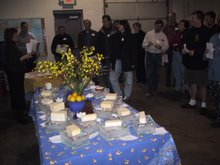Bee Alert When Checking Hives This Spring
This information comes from:
Extension and Ag Information
University of Missouri
COLUMBIA, Mo. - A new phenomenon among the beehives has beekeepers and researchers buzzing. A breakdown in normal colony structure is causing bees to abandon their hives, said a University of Missouri extension entomologist.
"They're leaving the queen, which is unusual," said Richard Houseman, associate professor of entomology. In many hives, there are no bees at all. The brood, or young, remain capped. Affected hives also are slow to be "robbed out" by other colonies. This phenomenon, first identified last fall, is known as Colony Collapse Disorder. Bee experts are unsure of the cause. The disorder has been reported in 24 states. Missouri is not on the list.
State entomologist Mike Brown said he hasn't had any official reports of CCD in Missouri. "Everything I have heard has been anecdotal," he said.
Both Houseman and Brown encourage beekeepers who have hives showing symptoms of the disorder to report their findings to the Missouri Department of Agriculture or the University of Missouri. They will need to complete a confidential survey about the details of their loss.
"It may provide some clues or common threads, such as practices beekeepers should avoid," said Houseman.
Art Gelder, owner of Walk-About Acres outside Columbia, also has heard of hives being affected. He has just begun to check hives and has already noticed one hive exhibiting symptoms of the disorder. "No bees," he said. "No dead bees, no live bees. Just honey.
"It's kind of scary. Not only can you lose half of your honey crop, but you also lose the pollination." And pollination is what the buzz is all about.
"In some states, the impact (of low bee numbers of pollination) may be large depending on the major crops," said Houseman. "In Missouri, our major crops are corn and soybeans, and they're self-pollinating."
He said growers of fruit and vegetable crops, such as apples, cucumbers and watermelons, may see an impact because those plants are pollinated by honey bees. Right now Missouri's bee status is unknown.
"More information should be made available as the temperatures start to warm and beekeepers start to get out to check their colonies," Brown said.
Gelder said he plans to report his loss after checking the rest of his hives.
"We just have to wait for scientists to figure out what's going on nd go from there," he said.
A multi-state working group comprised of researchers, extension agents and regulatory officials from Pennsylvania State University; Pennsylvania Department of Agriculture; Florida Department of Agriculture; Bee Alert Technology, Inc., affiliated with University of Montana; Florida Department of Agriculture; and the United States Department of Agriculture Agricultural Research Service is considering several hypotheses about possible causes, including transmitted pathogens, an immunosuppressive disorder and sublethal insecticides.
























